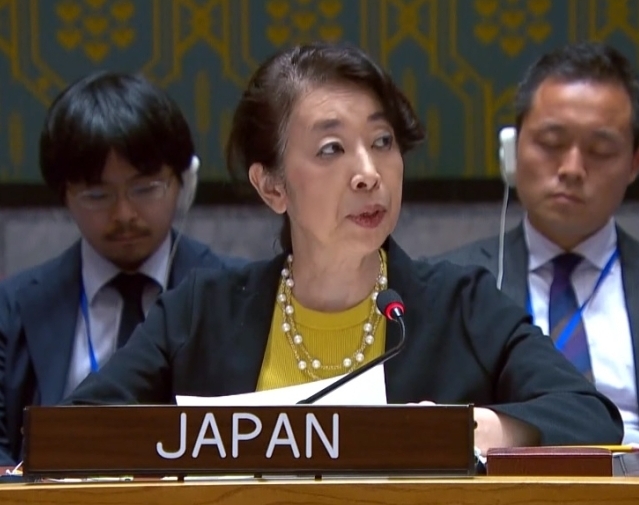国際刑事裁判所残余メカニズム(IRMCT)に関する討論における志野大使ステートメント
令和5年6月12日

(As delivered)
Madam President,
I thank President Gatti Santana and Prosecutor Brammertz for their informative reports and briefings. I would like to express our heartfelt condolences to the passing of Judge Elizabeth Ibanda–Nahamya, and I would like to show our gratitude for her dedication especially to the case of Kabuga. I also extend our sympathy and solidarity to the family, friends, and colleagues.
Madam President,
During the reporting period, the International Residual Mechanism for Criminal Tribunals (IRMCT) has shown progress in the areas of investigation and prosecution. Japan is committed to promoting the rule of law including the fight against impunity and the pursuit of transitional justice, and thus supports the role of the Mechanism. We would like to call upon all States to cooperate therewith.
Japan welcomes the recent arrest of Fulgence Kayishema, who had been long sought for the alleged atrocious murder of over 2,000 Tutsi refugees. As the Secretary-General has stated, “those who are alleged to have committed such crimes cannot evade justice and will eventually be held accountable, even more than a quarter of a century later.” We commend the Prosecutor and his team for their efforts, as well as the important support provided by South Africa, Eswatini, Mozambique, and Rwanda. We hope that the remaining three fugitives will be held accountable in the near future.
Another important development is the conclusion of the Stanišić and Simatović case, which is one of the remaining two cases dealt with by the Mechanism. Thirty years after its inception, we have finally witnessed the completion of the mandate given by the Security Council to the International Criminal Tribunal for the former Yugoslavia (ICTY). With regard to the other outstanding case, the Kabuga case, we note the trial chamber’s decision to adopt the “trial of the facts” procedure. Japan hopes these proceedings will lead to the finding of truth and contribute to future reconciliation.
Madam President,
Japan understands that fair and legitimate due process requires time. On the other hand, for victims and societies therein, justice needs to be done as expeditiously as possible. We encourage the Mechanism to advance its proceedings under a clear and reasonable timeline, and to use its accumulated information, evidence, and expertise in cooperating with national authorities in their endeavor to end impunity. In this regard, we acknowledge that the Mechanism continues to fulfill a limited but indispensable role to hold those responsible accountable.
Once again, let me reiterate Japan’s unwavering support for the activities of the Mechanism. We are committed to promote the rule of law together with fellow Member States and the international judicial institutions including the IRMCT.
I thank you, Madam President.
I thank President Gatti Santana and Prosecutor Brammertz for their informative reports and briefings. I would like to express our heartfelt condolences to the passing of Judge Elizabeth Ibanda–Nahamya, and I would like to show our gratitude for her dedication especially to the case of Kabuga. I also extend our sympathy and solidarity to the family, friends, and colleagues.
Madam President,
During the reporting period, the International Residual Mechanism for Criminal Tribunals (IRMCT) has shown progress in the areas of investigation and prosecution. Japan is committed to promoting the rule of law including the fight against impunity and the pursuit of transitional justice, and thus supports the role of the Mechanism. We would like to call upon all States to cooperate therewith.
Japan welcomes the recent arrest of Fulgence Kayishema, who had been long sought for the alleged atrocious murder of over 2,000 Tutsi refugees. As the Secretary-General has stated, “those who are alleged to have committed such crimes cannot evade justice and will eventually be held accountable, even more than a quarter of a century later.” We commend the Prosecutor and his team for their efforts, as well as the important support provided by South Africa, Eswatini, Mozambique, and Rwanda. We hope that the remaining three fugitives will be held accountable in the near future.
Another important development is the conclusion of the Stanišić and Simatović case, which is one of the remaining two cases dealt with by the Mechanism. Thirty years after its inception, we have finally witnessed the completion of the mandate given by the Security Council to the International Criminal Tribunal for the former Yugoslavia (ICTY). With regard to the other outstanding case, the Kabuga case, we note the trial chamber’s decision to adopt the “trial of the facts” procedure. Japan hopes these proceedings will lead to the finding of truth and contribute to future reconciliation.
Madam President,
Japan understands that fair and legitimate due process requires time. On the other hand, for victims and societies therein, justice needs to be done as expeditiously as possible. We encourage the Mechanism to advance its proceedings under a clear and reasonable timeline, and to use its accumulated information, evidence, and expertise in cooperating with national authorities in their endeavor to end impunity. In this regard, we acknowledge that the Mechanism continues to fulfill a limited but indispensable role to hold those responsible accountable.
Once again, let me reiterate Japan’s unwavering support for the activities of the Mechanism. We are committed to promote the rule of law together with fellow Member States and the international judicial institutions including the IRMCT.
I thank you, Madam President.
